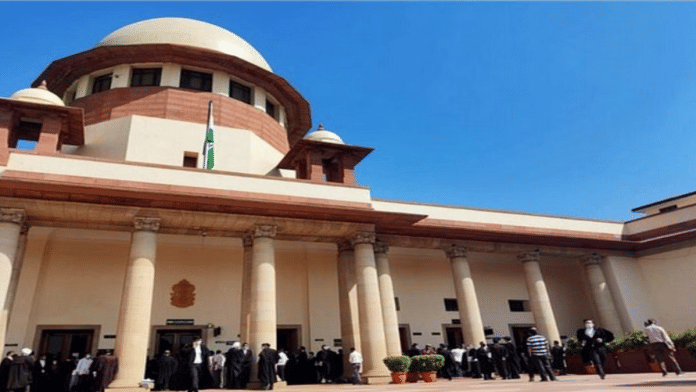New Delhi: A convict sentenced to a fixed jail term is entitled to automatic release once the incarceration period is over, the Supreme Court has ruled, ordering the release of Nitish Katara’s killer. The top court has also asked all states and UTs to identify and release any prisoners in jail beyond their sentence.
A bench of justices B.V. Nagarathna and K.V. Vishwanathan distinguished between “remission” and “release on completion of a sentence” and held that a convict who gets a fixed jail term need not apply to the state for release from jail on remission.
The bench laid down this principle as it allowed the immediate release of murder convict Sukhdev Yadav alias Pehalwan, who was given a 20-year-sentence in the 2002 Nitish Katara murder case. Yadav has been in jail for 20 years without remission. Therefore, the court held, his continued incarceration was “illegal”.
The court’s pronouncement came on Yadav’s petition demanding his automatic release, without applying for remission to the Delhi Government. The state, on the other hand, had opposed his petition, claiming that despite the 20-year fixed term, Yadav would have to approach the Sentence Review Board and seek remission because he was serving life imprisonment, which, as per the current legal framework, required him to stay behind bars for life.
Besides giving clarity on the legal principle, the bench issued directions to all States and Union Territories, instructing their home secretaries to identify and release any prisoners who remain in custody despite completing their court-imposed jail term, provided they are not wanted in any other case.
“There can’t be any further incarceration of the appellant from March 9, 2025, onwards… The continuous incarceration of the appellant was illegal. In fact, on March 10, 2025, the appellant ought to have been released,” the court said in its order.
Crux of the case
The core question before the Court was whether a convict, after completing a fixed term like 20 years without remission, should still seek a formal remission order from the competent authority.
Yadav was convicted in 2011 for murder, kidnapping, and destruction of evidence. The Sessions Court sentenced him to life imprisonment, but the Delhi High Court in 2015 modified it to “life imprisonment which shall be 20 years of actual imprisonment without consideration of remission,” a sentence later affirmed by the Supreme Court.
The appellant argued that he had completed his 20-year sentence on 9 March 2025, and was entitled to immediate release. The State and complainant, Katara’s mother, Neelam Katara, however, contended that despite completing 20 years, he was still serving a life term and needed to apply to the Sentence Review Board for remission.
The court explained that life imprisonment traditionally means imprisonment for the remainder of a convict’s natural life, and remission is the reduction of a sentence without changing its character. However, in fixed-term life sentences without remission, once the specified term is served, the convict is entitled to automatic release without the need for a remission application.
What the court said
Reviewing earlier rulings, including Swamy Shraddananda (2) (2008), Union of India vs. V. Sriharan (2016), Shiva Kumar vs. State of Karnataka (2023), and Navas alias Mulanavas vs. State of Kerala (2024), the court reiterated that constitutional courts have the power to impose fixed-term sentences beyond the application of remission.
Applying these principles, the Supreme Court concluded that Yadav’s continued incarceration beyond 9 March 2025, was illegal. “If the High Court had intended for the appellant to serve ‘life imprisonment till the end of his natural life’ even after 20 years, it would have specified so,” the bench observed.
The Court rebuked the Sentence Review Board for rejecting Yadav’s plea on conduct grounds, despite the High Court’s judicially determined sentence. “How can the Sentence Review Board sit over an order of the judicial authority? If this is the approach, then every convict will die in jail. Is this the conduct of an executive?” the bench asked.
Additional Solicitor General, Archana Pathak Dave, appearing for the Delhi government, argued there could be no automatic release after 20 years, saying a life term meant imprisonment for the remainder of a convict’s natural life. Senior Advocate Siddharth Mridul, representing Yadav, countered that there was “no lawful justification” to detain him beyond 9 March 2025.
The Court noted Yadav had served 20 years of uninterrupted incarceration without remission and had earlier been granted a three-month furlough in June 2025. Furlough, it clarified, is a temporary release from prison and not a suspension or reduction of the sentence.
Yadav’s latest plea challenged a November 2024 Delhi High Court order that dismissed his request for a three-week furlough.
In 2016, the Supreme Court had upheld a 25-year jail term without remission for co-convicts Vikas Yadav and Vishal Yadav, awarding Yadav a 20-year term. The three were convicted of abducting Katara from a wedding in Ghaziabad on 16-17 February 2002, and killing him over his relationship with Vikas Yadav’s sister Bharti Yadav.
Lastly, the court said, “We hold that in all cases where an accused/convict has completed his period of jail term, he shall be entitled to be released forthwith and not continued in imprisonment if not wanted in any other case. We say so in light of Article 21 of the Constitution of India which states that no person shall be deprived of his life or personal liberty except according to procedure established by law.”
The Supreme Court directed its Registry to circulate the order to all State and UT home secretaries and legal services authorities to ensure no convict remains in prison beyond their lawful sentence.
(Edited by Viny Mishra)






